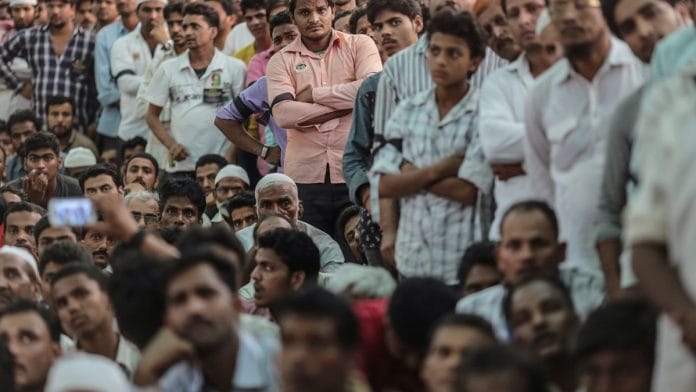New Delhi: Removing incentives that encourage small firms to not grow and bringing in labour reforms similar to those implemented by Rajasthan could help create jobs, the Economic Survey 2018-19 said Thursday.
Encouraging private investment will also help in creating rather than displacing jobs, the survey, authored by Chief Economic Adviser Krishnamurthy V. Subramanian, pointed out.
The recommendations of the survey come at a time when the Narendra Modi government is struggling to create sufficient jobs for the nearly 1 crore young people who are expected to join the labour force every year. The annual report on employment and unemployment based on the periodic labour force survey showed that the unemployment rate had hit a 45-year high of 6.1 per cent in 2017-18.
The data also showed that the unemployment rate for the age group of 15-29 years was at 17.8 per cent for all of India, representing one of the biggest challenges for the Modi government — providing employment to India’s aspirational youth who are believed to have voted him back to power for a second term.
Also read: Economic Survey projects optimistic 7% growth although slowdown shows no signs of abating
‘Policies that foster dwarfs’
The sharp rise in the unemployment rate in 2017-18 has been attributed partially to the Narendra Modi government’s decision to demonetise high-value currency, which kicked in from the midnight of 8 November 2016. The move, followed by a failure to rapidly remonetise the economy, had seen many small-scale units shutting down, rendering many people unemployed.
The survey focused on steps to “unshackle” micro, small and medium enterprises (MSMEs) in order to help them grow.
“Job creation in India suffers from policies that foster dwarfs, i.e. small firms that never grow, instead of infant firms that have the potential to grow and become giants rapidly,” the survey pointed out.
“While dwarfs, i.e., firms with less than 100 workers despite being more than 10 years old, account for more than half of all organised firms in manufacturing by number, their contribution to employment is only 14 per cent and to productivity is a mere 8 per cent,” it added.
“In contrast, large firms (more than 100 employees) account for three-quarters of such employment and close to 90 per cent of productivity despite accounting for about 15 per cent by number,” the survey pointed out.
The survey added that small firms find it difficult to sustain the jobs they create.
“Size-based incentives that are provided irrespective of firm age and inflexible labour regulation, which contain size-based limitations, contribute to this predicament,” it said. “To unshackle MSMEs and thereby enable them to grow, all size-based incentives must have a sunset clause of less than ten years with necessary grand-fathering.”
The survey also advocated deregulating labour law restrictions for job creation, and highlighted the success of Rajasthan vis-a-vis other states. It pointed out how one in three workers is not protected by the Minimum Wages Act of 1948. In a bid to highlight the complexity of the current framework, the survey underscored how there were 1,915 minimum wages defined for various job categories for unskilled workers across various states.
It also pointed out how capital investment fosters job creation rather than substituting labour, as the production of capital goods, research & development, and supply chains generate jobs.
Also read: Funds shrinking, Army wants Budget 2019 to make special allowance for GST, customs duties






